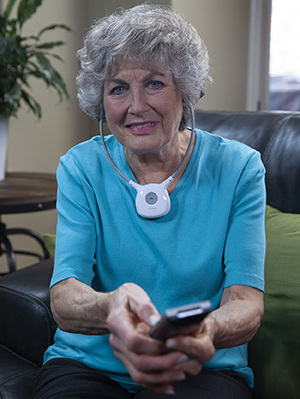Assistive listening devices (ALDs) can help you hear better. They are used alone or with a hearing aid. ALDs raise the volume of sounds that you may hear in your daily life. Read below to learn about the different kinds of ALDs.
Alerting devices
If you have trouble hearing sounds in your home, alerting devices can be installed. These have flashing lights, loud bells, or vibrators. They are activated by sounds around the home. These include the ringing of the phone or doorbell. They can let you know that there is a smoke alarm or crying baby. They can be used with an alarm clock.
TV listening devices
A TV listening device raises the volume on a TV. It does this without bothering people around you.
Personal communicators
A personal communicator helps you hear someone talk to you in a noisy place. It makes the speaker’s voice louder than the background noise. It can be used in places such as a restaurant or a car.
Phone amplifiers
A phone amplifier boosts the volume on a phone. A portable amplifier can be put over most phone receivers. You may be able to get this kind of device for a lower price. This is due to the Americans with Disabilities Act. To get this discount, you may need to fill out a form. Or you may need to get a note from your health care provider.
Group listening devices
These devices allow better sound to people in a group setting. Some theaters, museums, and concert halls have these devices. Some meeting rooms also have them. You can ask a receptionist or ticket-taker for more information.


